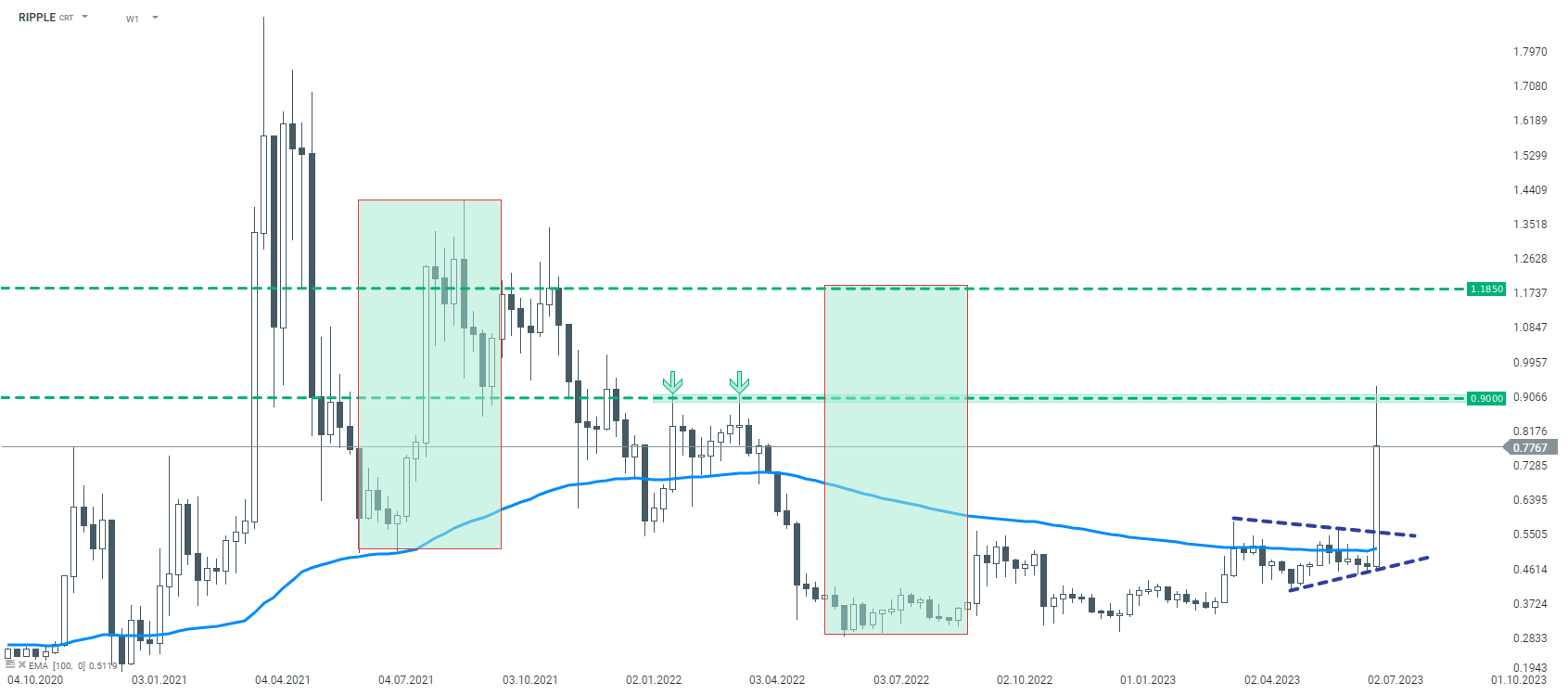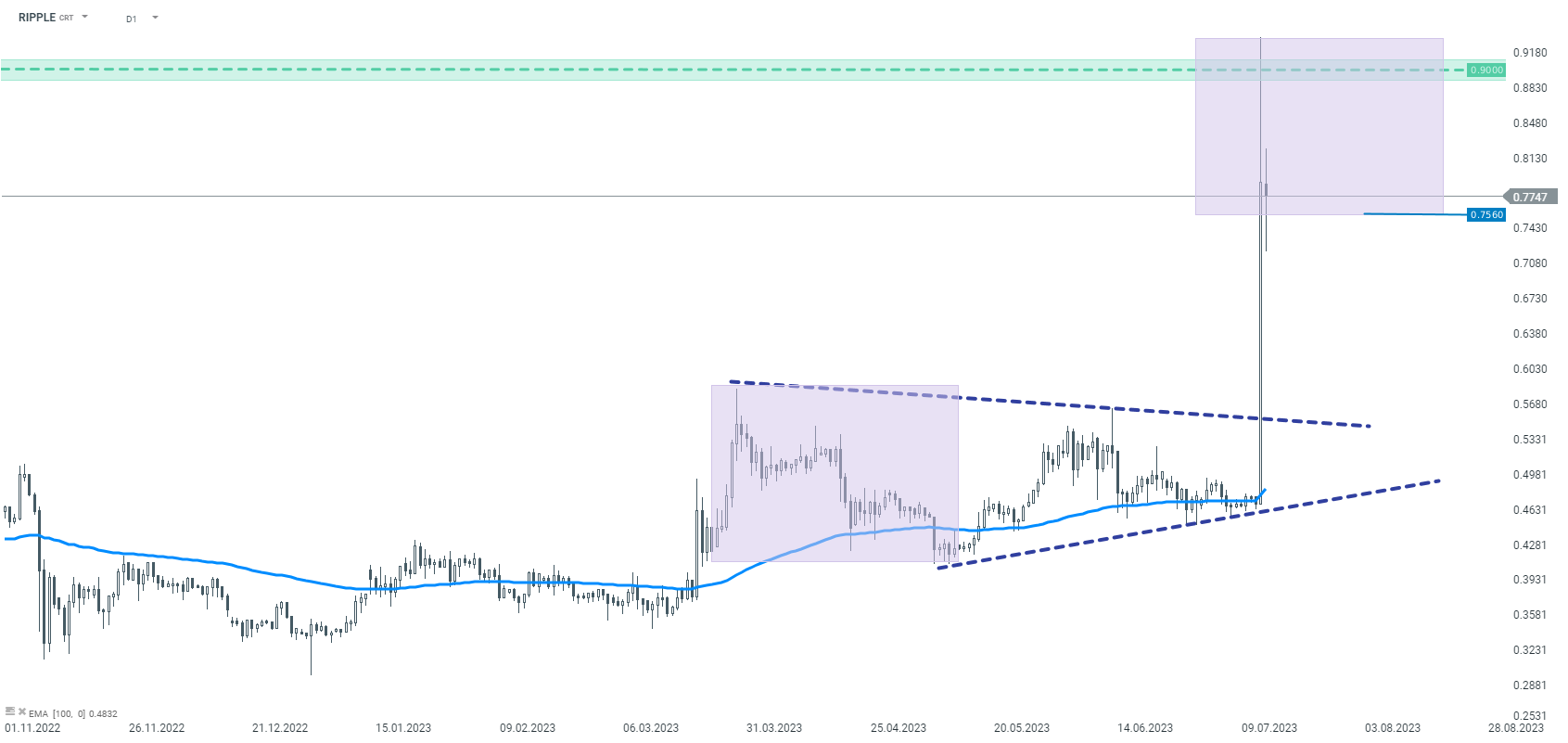Yesterday, after nearly a three-year legal battle, Ripple won the case against the SEC. Following this announcement, Ripple's gains reached as high as 90%, and the token's price surged from 0.47 to 0.90 USDT. Today, XRP is being traded at 0.77 USDT, which is still over 63% above its previous level.
What was the SEC vs Ripple case about?
The subject of the case was whether XRP, a digital asset or cryptocurrency created by Ripple Labs Inc., should be classified as a security under U.S. law. The U.S. Securities and Exchange Commission (SEC) had alleged that Ripple conducted an unregistered securities offering by selling XRP.
What are the conclusions?
XRP cannot be classified as a security. The court applied the Howey Test, a legal standard used to determine whether certain transactions qualify as "investment contracts" and thus securities. The court found that while XRP investors may have had an expectation of profit, these profits were not solely derived from the efforts of Ripple or a third party. Therefore, XRP did not meet all the criteria of the Howey Test and could not be classified as a security. This decision sets a significant precedent for the classification and regulation of cryptocurrencies in the future.
What is the true verdict from the court? 🔎
The court ruled in favor of Ripple, granting its motion for summary judgment on the SEC's first claim for relief. The court found that the SEC failed to prove that the XRP sold by Ripple was an "investment contract" and therefore a "security" under federal securities laws. The court reasoned that the purchasers of XRP did not have an expectation of profits based on the efforts of Ripple. Additionally, the court denied the SEC's motion for summary judgment on Ripple's fair notice defense, citing genuine issues of material fact as to whether the SEC provided Ripple with fair notice that its sales of XRP could be illegal securities transactions.
The court also upheld Ripple's fair notice defense, noting that the SEC's guidance on when digital assets may be classified as securities was not clear at the time of Ripple's XRP sales. No penalty was imposed on Ripple, as the court found that Ripple did not have fair notice from the SEC that it was violating the law. The court's ruling does not affect the status of future sales of XRP, and it dismissed the SEC's claims against Brad Garlinghouse and Chris Larsen, finding that the SEC failed to prove that they aided and abetted Ripple's alleged violations.
What about ICO and fundraising?
The sale of a token on an exchange is not deemed a security. However, the court also made reference to the Initial Coin Offering and the fundraiser round before the ICO, which was directed towards private funds and venture capitals. Although this judgment was not the subject of this case, it is not as optimistic as it could be.
The court ruled that Ripple's sale of XRP to institutional investors constituted an unlawful security sale, while sales to random individuals did not. The court's distinction was based on the fact that the random buyers couldn't know if their payments went to Ripple or another seller of XRP. However, being realistic, this should not matter under the Howey test, which focuses on whether buyers can expect profits from the efforts of a third party. The court's decision could have implications for other projects like Ethereum, which also had a pre-sale of tokens with certain similarities.
While the ruling may be a victory for Ripple, whether it will be long lived is uncertain and it leaves numerous securities-related questions unanswered. As the crypto community awaits further developments, it emphasizes the need for a fair and comprehensive assessment that provides clarity and stability for both crypto projects and investors in the evolving regulatory landscape.
Summing up
The court's decision indeed carries significant implications for the cryptocurrency industry, as it establishes a precedent for the classification and regulation of cryptocurrencies going forward. However, there is a possibility that both Ripple and the SEC will appeal the recent ruling. Furthermore, concerns arise from Judge Analisa Torres' statement declaring the $700 million in XRP sales as unlawful. Therefore, the legal proceedings may be far from over and further actions will be taken as the parties involved seek ultimate clarity and resolution.
 Looking at the weekly chart, Ripple's price broke out from consolidation and reached resistance at 0.9000, which corresponds to the peaks from February and March 2022, where sellers emerged. If the upward movement resumes and the mentioned resistance is broken, a potential move towards 1.1850 would not be ruled out.
Looking at the weekly chart, Ripple's price broke out from consolidation and reached resistance at 0.9000, which corresponds to the peaks from February and March 2022, where sellers emerged. If the upward movement resumes and the mentioned resistance is broken, a potential move towards 1.1850 would not be ruled out.
 Regarding the D1 timeframe, attention should be paid to the support level determined by the local geometry of 1:1. As long as the price remains above this level, there is a chance for another attempt to break the resistance at 0.90 USD. However, if the geometry is invalidated, a larger downward correction may occur.
Regarding the D1 timeframe, attention should be paid to the support level determined by the local geometry of 1:1. As long as the price remains above this level, there is a chance for another attempt to break the resistance at 0.90 USD. However, if the geometry is invalidated, a larger downward correction may occur.

Daily summary: Weak US data drags markets down, precious metals under pressure again!

🚨 Bitcoin drops to $69,000 📉 A 1:1 correction scenario?

Market wrap: Novo Nordisk jumps more than 7% 🚀

Crypto news: Bitcoin falls below $70k 📉Will crypto slide again?
This content has been created by XTB S.A. This service is provided by XTB S.A., with its registered office in Warsaw, at Prosta 67, 00-838 Warsaw, Poland, entered in the register of entrepreneurs of the National Court Register (Krajowy Rejestr Sądowy) conducted by District Court for the Capital City of Warsaw, XII Commercial Division of the National Court Register under KRS number 0000217580, REGON number 015803782 and Tax Identification Number (NIP) 527-24-43-955, with the fully paid up share capital in the amount of PLN 5.869.181,75. XTB S.A. conducts brokerage activities on the basis of the license granted by Polish Securities and Exchange Commission on 8th November 2005 No. DDM-M-4021-57-1/2005 and is supervised by Polish Supervision Authority.


